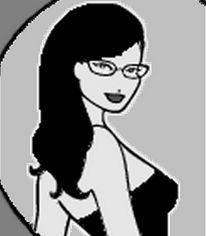depeche mode > the biography
If U2 are the world's biggest rock band, then Depeche Mode are the world's biggest cult band. Their beginnings: as a slightly camp, poppy fresh-faced group straight out of Basildon, Essex (which is not exactly synonymous with all that is hip and happening) specialising in candyfloss tunes and fluffy, slightly questionable lyrics.
Dave Gahan had been recruited from his daily activities of stealing cars to play starring role as the voice of Depeche Mode – the magnetic, crotch-grabbing, arse-shaking, arm-waving lead singer. The band’s lyricist and songwriter, Martin L. Gore, who has seemingly had a bad hair lifetime, was a shy teenager who later had a penchant for hitting S&M clubs and wearing leather skirts. Andy (‘Fletch’) Fletcher was the non-musician of the group, these days looking like the world’s least likely rock star with his sensible jumpers and glasses - more like a rakish accountant, perhaps - but was the emotional core of the group. Andy did not get on with Alan Wilder, who has since left the band (along with Vince Clarke, an original founding member), who, with his upper-middle-class upbringing, had considerable musical talent and was responsible for dramatically injecting a greater sense of sonic drive and adventure to the band’s earlier work.
With a career spanning 20+ years, DM's internal struggles have been gleefully well documented by the press. Sex, drugs and rock-n-roll were nothing new to DM, and the excesses of non-stop touring took their toll on the band. The infamous Devotional tour, which was comprised of over 150 dates during a 15-month period, nearly killed them. Quite appropriately, it was dubbed ‘the most debauched tour ever’ by Q Magazine - its road crew included a drug dealer and psychiatrist, both employed by the band. Dave, by now fully absorbed in the LA grunge scene, shocked his bandmates when he showed up at a session plastered with tattoos. He had become a junkie, his diet consisting mainly of vodka, cocaine and heroin. He suffered a heart attack and collapsed backstage; shortly thereafter he overdosed again - this time on a particularly potent blend of heroin and cocaine, taken intravenously - and when later found unconscious, lapsed into a two-minute period of clinical death. He certainly looked and acted like the proverbial rock star, and this fact was cemented by an episode involving a midnight snack of wine, a handful of valium pills, accompanied by a razorblade.
Martin instead opted for binge drinking and partying, reportedly downing over 70 glasses in one marathon 11-hour session. Andy was diagnosed with depression and later suffered a nervous breakdown due to mental stress and anxiety. Meanwhile Alan, citing unhappy working conditions, quit after Devotional. The band members would go for days without speaking to each other, and sometimes would not see Dave for three or four days at a time. Dave responded by turning a closet in his house into ‘The Blue Room’, where he could shoot up in peace. By the final dates of the tour, he was babbling incomprehensibly, acting erratically, disturbingly resembling a tattoo-covered Christ figure, with his pale, emaciated body and long, stringy hair.
The road to recovery was long and difficult. Dave, offered a choice of jail, death or rehab, thankfully chose the latter. Martin kicked his habit, and Andy too eventually reappeared back in the studio. Preliminary recording sessions were disastrous however, with Dave’s ordinarily resonant baritone being so destroyed by drugs that a vocal coach needed to be hired. But the band clung on, and those days are now long gone. Since then, the three remaining DM members have been happy, healthy, cleaned up, and settled down with families. On current tours, the band are no longer interested in anything stronger than a couple of glasses of red wine and some cigarettes, their only remaining vice.
With all due respect to Oasis, DM are arguably the most influential band Britain has produced. It is impossible to deny the impact that DM has had on many generations of artists, with the Nine Inch Nails, Marilyn Manson, and Garbage citing DM as an influence, just to name a few. They were the pioneers of electronic music, transforming it from a medium of blips and beeps into something much more lyrically-driven and fuller-bodied, equally at home on the dancefloor as in a stadium. What began as bubblegummy synth-driven pop in the 80s has since evolved into a mature, guitar- but still primarily synth-driven melange of rock, pop, and electronica, with a touch of blues and gospel thrown in for good measure. Well-known classics include the groundbreaking Black Celebration, which was the first album to fully explore the suitably dark side of love; the slinky dancefloor rhythms found on the band’s most commercially successful album, Violator; the gospel-tinged soul-rock of Songs of Faith and Devotion, their grandest, rockiest affair yet; and of course their comeback album Ultra, which is, interestingly, equal parts seductiveness and grittiness. Critics are quick to classify DM as reformed goths who appeal only to a generation of mopey, depressed individuals still stuck in the 80s. Martin’s hypersensitive, complex lyrics - which explore love as obsession, sex as addiction, sin as indulgence, and religion and redemption - are partly to blame.
I have always enjoyed rock, electronica, and to some extent, pop, and it was in DM that I found the perfect balance between these genres. They’re rock, but not quite; they’re electronic, but not really; and whether they really are pop is questionable. DM have continuously pushed the limit with each subsequent album that they have released. Never wanting to conform to the same sound, each album challenged its predecessor and set a new musical standard, continually pushing the envelope in terms of creativity, sound and emotion. Martin’s lyrics read like gorgeous poetry, and Dave has quite possibly the most sensual voice I’ve ever heard.
Enjoy the forthcoming reviews of the DM discography.




